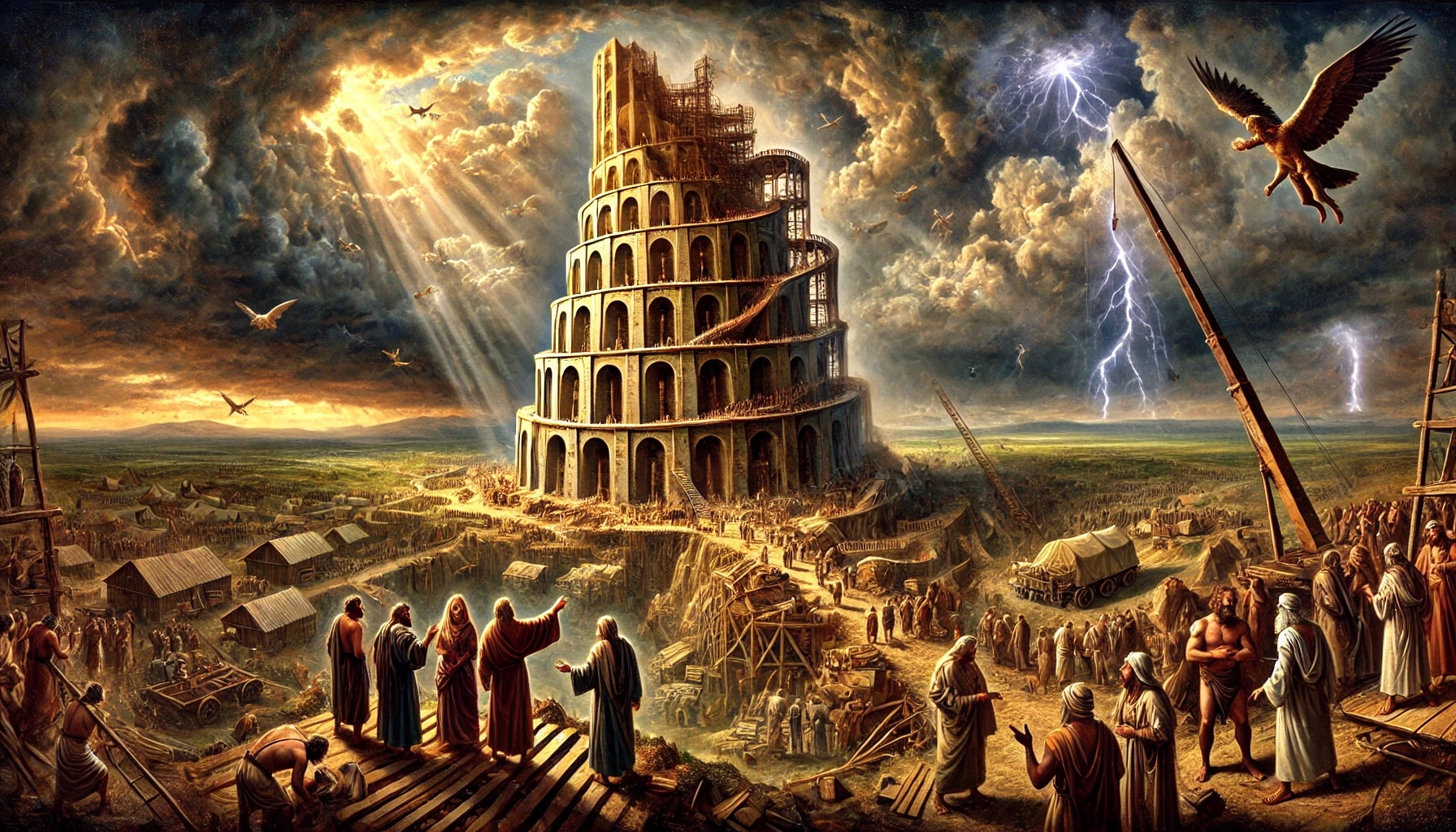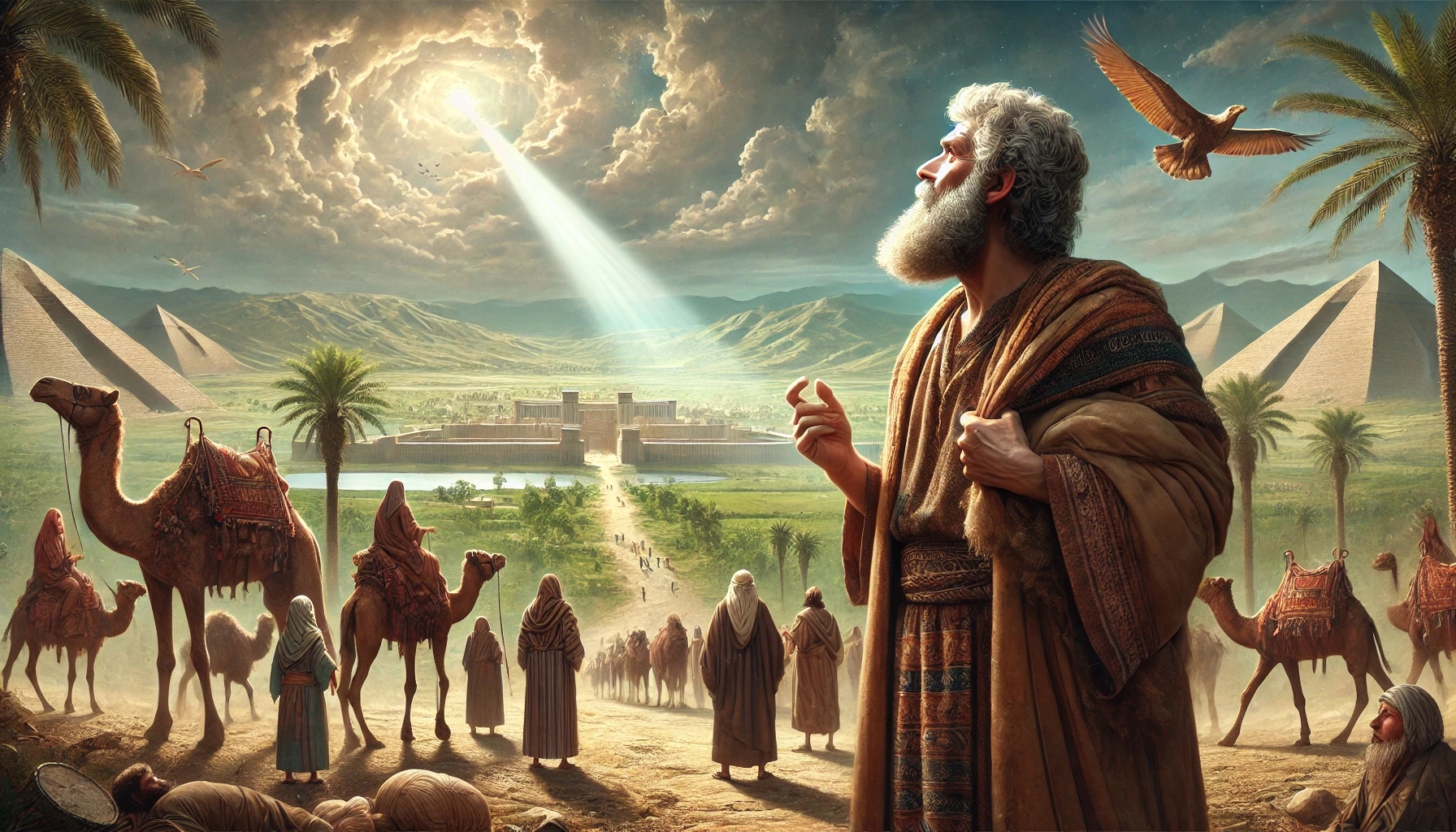 June 16, 2025
June 16, 2025
 DAILY BIBLE READING
DAILY BIBLE READING
 Exodus 11 – The Exodus Commanded
Exodus 11 – The Exodus Commanded
 The Threat of the Tenth Plague – God’s Final Warning to Egypt
The Threat of the Tenth Plague – God’s Final Warning to Egypt
══════════════════════════════════════════════
 Bible Text – Exodus 11 (KJV)
Bible Text – Exodus 11 (KJV)
1 And the Lord said unto Moses, Yet will I bring one plague more upon Pharaoh, and upon Egypt; afterwards he will let you go hence: when he shall let you go, he shall surely thrust you out hence altogether.
2 Speak now in the ears of the people, and let every man borrow of his neighbour, and every woman of her neighbour, jewels of silver and jewels of gold.
3 And the Lord gave the people favour in the sight of the Egyptians. Moreover the man Moses was very great in the land of Egypt, in the sight of Pharaoh’s servants, and in the sight of the people.
4 And Moses said, Thus saith the Lord, About midnight will I go out into the midst of Egypt:
5 And all the firstborn in the land of Egypt shall die, from the first born of Pharaoh that sitteth upon his throne, even unto the firstborn of the maidservant that is behind the mill; and all the firstborn of beasts.
6 And there shall be a great cry throughout all the land of Egypt, such as there was none like it, nor shall be like it any more.
7 But against any of the children of Israel shall not a dog move his tongue, against man or beast: that ye may know how that the Lord doth put a difference between the Egyptians and Israel.
8 And all these thy servants shall come down unto me, and bow down themselves unto me, saying, Get thee out, and all the people that follow thee: and after that I will go out. And he went out from Pharaoh in a great anger.
9 And the Lord said unto Moses, Pharaoh shall not hearken unto you; that my wonders may be multiplied in the land of Egypt.
10 And Moses and Aaron did all these wonders before Pharaoh: and the Lord hardened Pharaoh’s heart, so that he would not let the children of Israel go out of his land.
══════════════════════════════════════════════
 Introduction
Introduction
After nine painful plagues, the turning point has come: God, through Moses, announces the tenth and most severe plague – the death of the firstborn. This is not merely a threat, but the final divine confrontation with Pharaoh’s hardness of heart. Chapter 11 is short but powerful. It prepares the way for Israel’s final departure and highlights God’s power to both judge and protect His people.
══════════════════════════════════════════════
 Commentary
Commentary
1. God’s Announcement (Verses 1–3)
God speaks directly to Moses: “I will bring one more plague.” This shows that God acts with purpose—nothing is random. The tenth plague will break Pharaoh’s resistance. God even promises that Pharaoh will not only release the Israelites but drive them out.
-
Verse 2: The Israelites are to ask the Egyptians for silver and gold items—a divine form of compensation for 400 years of slavery.
-
Verse 3: God grants the people favor in the eyes of the Egyptians. Moses himself has become a highly respected figure, even among Pharaoh’s servants.
2. The Tenth Plague Foretold (Verses 4–8)
Moses now speaks with divine authority: God Himself will go through the land at midnight. The judgment will be devastating:
-
Verse 5: Every firstborn—from Pharaoh’s son to the slave woman’s child, even among animals—will die.
-
Verse 6: A great cry will rise throughout Egypt—unmatched in history.
-
Verse 7: But Israel will be protected: “Not even a dog will bark.” A vivid image of divine peace and the distinction God makes between Egypt and Israel.
-
Verse 8: Moses proclaims that Pharaoh’s officials will beg him to lead the people out. Then he will go—not in peace, but in holy anger.
3. Divine Confirmation (Verses 9–10)
God reminds Moses again: Pharaoh will not listen—so that God’s wonders may be multiplied in Egypt.
Even though Moses and Aaron had already performed many signs, Pharaoh’s heart remains hardened—not due to a lack of proof, but due to deliberate resistance.
══════════════════════════════════════════════
 Summary
Summary
Exodus 11 is the dramatic preparation for the final plague: the death of the firstborn. God announces that this will be the definitive turning point. While Egypt will be plunged into grief, Israel will experience divine protection and favor. Moses emerges as a courageous and righteous leader, while Pharaoh remains blind to God’s hand.
══════════════════════════════════════════════
 Message for Us Today
Message for Us Today
-
God’s patience is great, but it is not limitless. Continued resistance to His voice has consequences.
-
God ensures justice: What was taken from His people will be returned—by His command.
-
God distinguishes His people: Even today, He knows His own and protects them—even amid judgment.
-
Spiritual hardening is dangerous: It is not the absence of signs, but the condition of the heart that determines whether we recognize God’s work.
══════════════════════════════════════════════
 Thought Prompt
Thought Prompt
 Where in my life am I warning others or being warned—and perhaps not taking it seriously enough?
Where in my life am I warning others or being warned—and perhaps not taking it seriously enough? Am I experiencing God’s protection in the midst of turmoil or uncertainty?
Am I experiencing God’s protection in the midst of turmoil or uncertainty? Am I willing, like Moses, to proclaim God’s message boldly and faithfully, even in the face of rejection?
Am I willing, like Moses, to proclaim God’s message boldly and faithfully, even in the face of rejection?
~~~~~ ~~~~~
~~~~~

 June 15 – 21, 2025
June 15 – 21, 2025
 WEEKLY SPIRIT OF PROPHECY READING
WEEKLY SPIRIT OF PROPHECY READING
 Ellen G. White │ Patriarchs and Prophets – Chapter 12
Ellen G. White │ Patriarchs and Prophets – Chapter 12
 Abraham in Canaan
Abraham in Canaan
 Read online here
Read online here
══════════════════════════════════════════════
 Introduction
Introduction
After his return from Egypt, Abraham settles once again in Canaan. Wealthy in livestock, silver, and gold, it soon becomes clear: true prosperity requires selfless character and unwavering trust in God’s promises. Abraham demonstrates how faith, kindness, and reverence for God not only shape him, but also influence those around him and his entire legacy.
══════════════════════════════════════════════
 Commentary
Commentary
1.Return, Separation from Lot, and Humble Selflessness
Genesis 13:2–12: Abraham returns home “very rich” and peacefully shares the land with Lot. Although God promised him the entire region, he lets Lot choose first (cf. Gen 13:8–9). Lot chooses the fertile Jordan Valley, ignoring spiritual dangers. Abraham humbly withdraws to Hebron and builds an altar in Mamre.
2.Patriarch as a Bearer of Light: A Testimony in Canaan
- Genesis 13:13–17: Through his simple shepherd life in the highlands, Abraham exemplifies faith: hospitality, God-fearing conversation, trust in God’s protection. His character exerts a quiet yet powerful influence on the pagan rulers.
3.War to Rescue His Nephew: Justice and Nobility
- Genesis 14:1–16: After Lot is taken captive, Abraham leads 318 loyal men against the mighty Elamites. He rescues Lot and his family, without greedily taking from the spoils (Gen 14:22–23). His actions prove that faith is not cowardice, and that justly won freedom should not be used for personal gain.
4.Covenant with God: Star-Faith and Sacrificial Ceremony
- Genesis 15:1–21: Despite struggling with doubts about having an heir, Abraham shows deep faith: he looks at the stars and believes God’s word that his descendants will be as numerous (15:5–6). In the covenant ceremony, he walks between the sacrificed animals in a sign of unconditional obedience, while God Himself appears as a blazing flame (15:17–18).
5.Covenant of Circumcision and Name Change
- Genesis 17:1–27: God renews and confirms the covenant, giving Abraham and Sarah new names (“Father of many nations”, “Princess”) and institutes circumcision as an eternal sign of faith (Romans 4:11).
6.Hospitality and Intercession: From Tent to Prayer
- Genesis 18:1–33: In the oaks of Mamre, Abraham honors three heavenly visitors with exemplary hospitality (Heb 13:2). He learns of God’s plan for Sodom and intercedes boldly for the righteous (Gen 18:23–33), until God promises to spare the city for the sake of just ten righteous people.
══════════════════════════════════════════════
 Summary
Summary
Abraham’s life in Canaan displays the many facets of true faith: generous selflessness (separation from Lot), convincing testimony (as a shepherd), courageous justice (rescuing Lot), steadfast covenant faith (counting stars and circumcision), and passionate intercession (for Sodom). Time and again, he demonstrates that God’s blessing and calling require a life of humility, obedience, and active love.
══════════════════════════════════════════════
 Message for Us Today
Message for Us Today
Selfless generosity creates peace and opens space for God’s blessing.
Testimony through daily life speaks louder than words.
Steps of faith – even in doubt – lead to new promises.
Family and church thrive on visible signs and consistent obedience.
Intercession and hospitality reflect a heart that mirrors God’s love.
═════════════════════════════════════════════
 Reflection Question
Reflection Question
- Where can I, like Abraham, selflessly lay down my rights today to bring peace?
- In what “highland” of my daily habits do I shine as a biblical witness?
- What step of “star-counting” faith could I dare to take, even when my circumstances seem uncertain?
- How do I practice genuine hospitality and intercession in daily life, as Abraham did?
Source: https://fulfilleddesire.net/16-06-2025-exodus-chapter-11-believe-his-prophets/
 16.06.2025 | True Greatness – Boasting in the Right Thing | HEART ANCHOR
16.06.2025 | True Greatness – Boasting in the Right Thing | HEART ANCHOR Let the one who boasts, boast in this: that they know me
Let the one who boasts, boast in this: that they know me Jeremiah 9:23–24
Jeremiah 9:23–24 Introduction
Introduction Devotional
Devotional Story – “Building the Tower in the Youth Basement”
Story – “Building the Tower in the Youth Basement” Thoughts
Thoughts What Does This Mean for You?
What Does This Mean for You? Impulses for Today
Impulses for Today Prayer
Prayer June 15, 2025
June 15, 2025 DAILY BIBLE READING
DAILY BIBLE READING Exodus 10 – Locusts and Darkness – God’s Call to Repentance
Exodus 10 – Locusts and Darkness – God’s Call to Repentance When Power Confronts God’s Grace
When Power Confronts God’s Grace Bible Text – Exodus 10 (KJV)
Bible Text – Exodus 10 (KJV) Introduction
Introduction Commentary
Commentary Summary
Summary Message for Us Today
Message for Us Today Thought Prompt
Thought Prompt
 June 15 – 21, 2025
June 15 – 21, 2025 Reflection Question
Reflection Question 15.06.2025 | My Deepest Longing – God Alone Suffices | HEART ANCHOR
15.06.2025 | My Deepest Longing – God Alone Suffices | HEART ANCHOR Only You Fill My Heart – Beyond All Transience
Only You Fill My Heart – Beyond All Transience Psalm 73:25
Psalm 73:25 Introduction
Introduction Devotional
Devotional Story – “The Lost Starfish”
Story – “The Lost Starfish” Thoughts
Thoughts What Does This Mean for You?
What Does This Mean for You? Impulses for Today
Impulses for Today Prayer
Prayer June 14, 2025
June 14, 2025 DAILY BIBLE READING
DAILY BIBLE READING Exodus 9 – God’s Power Against a Hardened Heart
Exodus 9 – God’s Power Against a Hardened Heart Pestilence, Boils, and Hail – when mercy and judgment meet
Pestilence, Boils, and Hail – when mercy and judgment meet Bible Text – Exodus 9 (KJV)
Bible Text – Exodus 9 (KJV) Introduction
Introduction Commentary
Commentary Summary
Summary A Message for Us Today
A Message for Us Today Thought Prompt
Thought Prompt
 June 8 – 14, 2025
June 8 – 14, 2025 Reflection Question
Reflection Question
